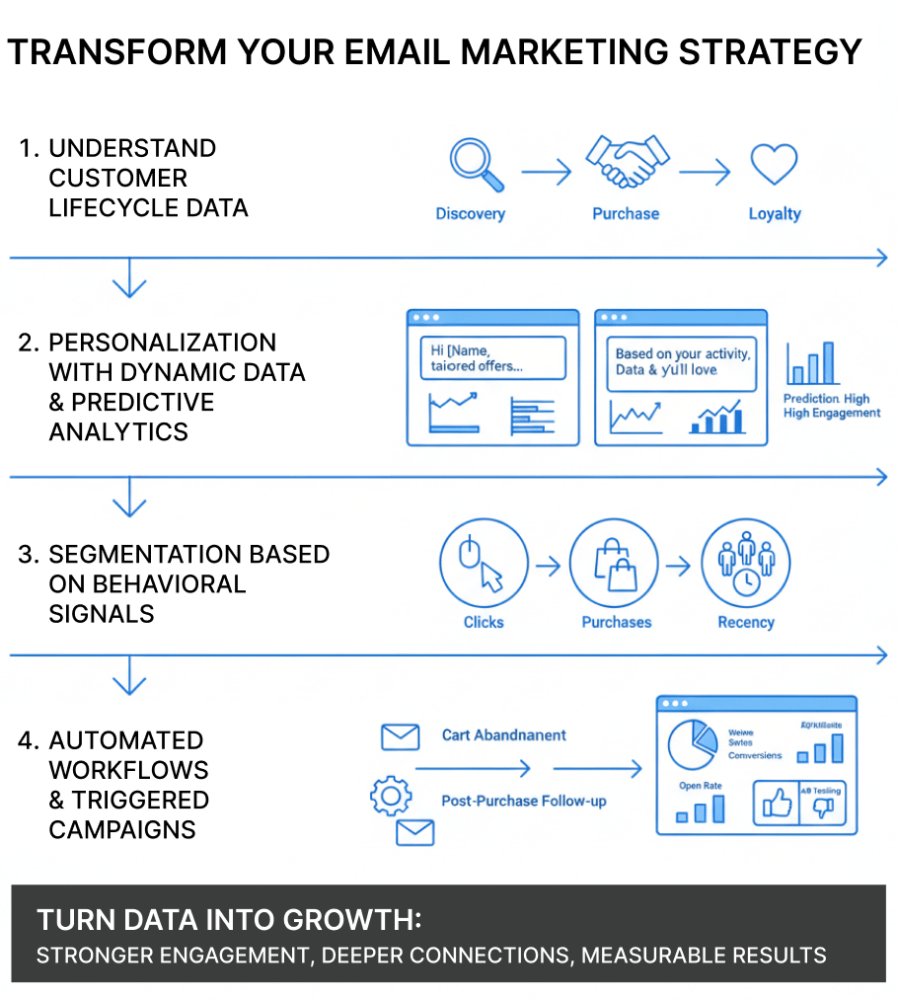Email inboxes are crowded, and attention slips away in seconds. Marketers need precision to stand out. CRM tools reveal what drives action, yet many professionals still overlook their hidden potential. Small details in data can change an entire campaign’s outcome. The challenge lies in seeing those details clearly and acting on them quickly.
When email and CRM work together, messages reach the right people at the right time. The result is stronger engagement, deeper connections, and measurable growth.
Understand and Leverage Customer Lifecycle Data
Every customer moves through distinct stages, from discovery to long-term loyalty. CRM systems track these stages with precision, recording purchase history, browsing activity, and frequency of interactions. This data reveals where someone stands in their journey and what they might need next.
Email campaigns built on lifecycle insights resonate more strongly. A first-time buyer benefits from welcome emails, while loyal customers respond better to rewards or exclusive offers. Each message aligns with a stage, strengthening trust and boosting retention.
Lifecycle data prevents wasted effort. Instead of sending identical campaigns, marketers send tailored messages that reflect a customer’s readiness to act. This strategic use of CRM insights turns one-time buyers into repeat customers.
Personalization through Dynamic Data and Predictive Analytics
Customers expect emails that reflect their needs. CRM platforms make this possible by storing purchase history, preferences, and interaction timelines. Using this data, marketers can move beyond generic greetings and deliver messages that feel tailored to each recipient.
Predictive analytics deepens this personalization. By analyzing patterns, CRM systems forecast which customers are likely to churn or which products they might buy next. These insights guide timely offers that align with real customer behavior.
When expertise is limited, businesses can hire a certified consultant to set up predictive models correctly. This ensures data fields connect smoothly, recommendations display accurately, and triggers function without errors. Done well, personalization builds trust and boosts long-term loyalty.
Segmentation Based on Behavioral and Engagement Signals
Basic demographics reveal little about customer intent. CRM platforms unlock richer insights by capturing actions such as browsing patterns, purchase frequency, and email engagement. These signals provide a clearer picture of interest levels and potential buying behavior.
Segmentation built on this data drives precision. Dormant subscribers can receive win-back emails, while highly active users might get loyalty rewards or early access offers. Each group experiences messaging tailored to their behavior, increasing relevance and improving conversion rates.
Marketers who refine segments consistently see stronger results. Instead of casting wide nets, they target smaller, well-defined groups with content that resonates. CRM insights transform raw engagement data into meaningful audience clusters that fuel smarter campaigns.
Automated Email Workflows and Triggered Campaigns
Timely communication builds stronger relationships. CRM systems make this possible by powering automated workflows that deliver the right message without constant manual effort. A well-structured workflow can welcome new subscribers, nurture leads, or re-engage inactive contacts.
Triggers increase efficiency by responding instantly to customer actions. A cart abandonment email reminds shoppers of items left behind. A follow-up after purchase can suggest complementary products or request feedback. Each trigger adds relevance and reduces missed opportunities.
Email marketing automation works best when regularly tested and refined. Reviewing workflow performance ensures emails remain accurate, helpful, and aligned with customer expectations. This balance of speed and precision keeps campaigns effective over time.
Measure, Analyze, and Iterate Using CRM-Driven Metrics
Strong campaigns rely on evidence, not guesswork. CRM platforms provide detailed metrics such as open rates, click-through rates, conversions, and customer lifetime value. These numbers show what works and where adjustments are needed.
A/B testing sharpens insights further. Testing subject lines, send times, or content variations reveals patterns that drive higher engagement. CRM dashboards make results easy to compare, helping teams decide which tactics to expand or replace.
Iteration keeps strategies fresh. Small improvements compound when applied consistently, leading to measurable growth. With CRM data guiding each decision, email campaigns evolve into reliable drivers of revenue and retention.
Wrapping Up

Email marketing succeeds when powered by clear CRM insights. Lifecycle tracking, smart segmentation, and meaningful personalization transform scattered messages into targeted communication. Automated workflows ensure no opportunity is missed, while clean data safeguards both deliverability and trust. Metrics then complete the cycle, turning raw results into actionable improvements.












